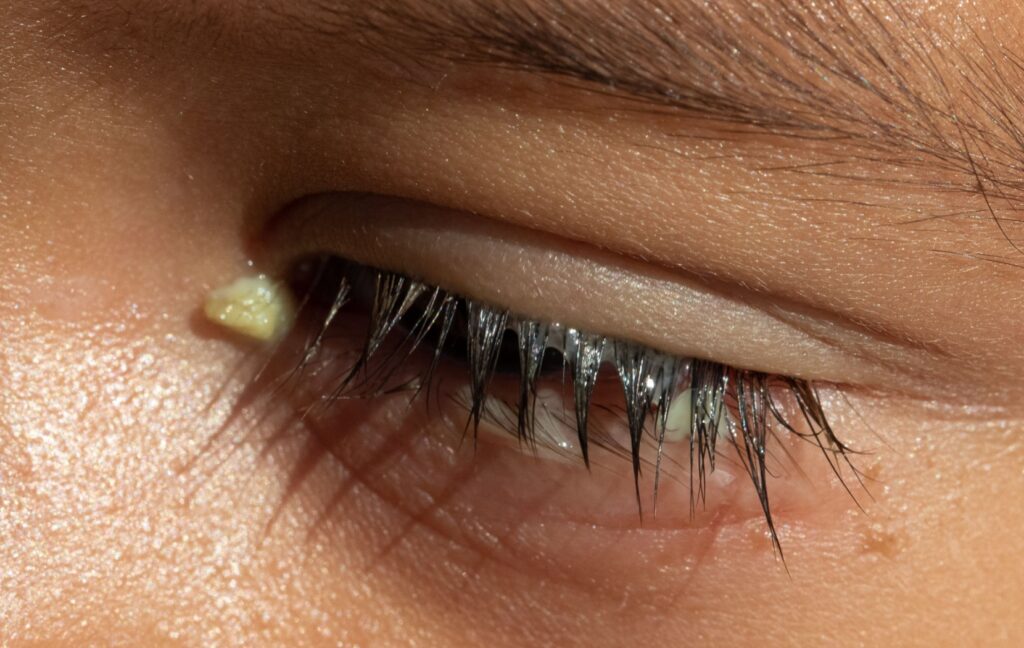Waking up and feeling that gritty, crusty substance at the corners of your eyes is a shared—and slightly annoying—experience for most people. This substance, called “sleep”, is something we’ve all dealt with, but what do we know about it? What is it, and why does it appear?
Sleep, also called “eye discharge” or “rheum”, forms when oils, mucus, skin cells, and other debris accumulate in the corner of your eyes while you sleep. While waking up with sleep in your eyes is normal, some eye conditions, such as dry eye and blepharitis, can cause more sleep or abnormal sleep.
What Is “Sleep”?
The crusty residue some people call “sleep” is officially known as eye discharge. This discharge is an accumulation of mucus, oil, skin cells, and other debris naturally accumulating in your eyes throughout the day and night.
During the day, your regular blinking helps rinse away these substances and keeps your eyes fresh. However, when you sleep—and your eyes aren’t blinking—the discharge collects and dries in the corners of your eyes.
Eye discharge can vary in texture and consistency, appearing watery, sticky, or crusty. For most people, it’s harmless and helps maintain healthy eyes.
What’s in Sleep?
To better understand what causes “sleep” in your eyes, you need to consider its primary components:
- Mucus, which traps dirt and debris and keeps your eyes lubricated.
- Tears clean the surface of your eyes and provide essential moisture.
- Oils stabilize your tears and prevent them from evaporating too quickly.
When these materials mix as your eyes rest, they form the discharge you instinctively wipe away in the morning.
Why Do Your Eyes Produce Sleep?
Eye discharge may seem inconvenient, but it’s a sign that your eyes are doing their job. Here’s why it forms:
Cleansing and Protection
Your eyes are constantly exposed to dust, pollutants, and airborne microorganisms. The mucus in your eyes acts as a natural filter to trap this debris. Blinking washes it away with the help of tears during the day. Overnight we don’t blink so the trapped debris accumulates into visible discharge.
Lubrication
Your eyes have to stay moist and healthy, even while you’re sleeping. Tear film, spread evenly by blinking, hydrates your eyes throughout the day. During sleep, tears and mucus mix to provide moisture and prevent your eyes from drying out, leaving behind the “sleep” residue.
Self-Repair
Our bodies use sleep as a time to repair, and the eyes are no exception. The mucus buildup and cellular debris during sleep reflect the eyes’ natural cleaning and renewal processes.

Different Types of Eye Discharge & What They Mean
While normal eye discharge is generally harmless, changes in its color, texture, or volume could signal underlying issues. Here’s what your eye discharge could mean:
White or Clear Discharge
This is standard and nothing to worry about. It typically appears as a thin, crusty residue in the morning and indicates healthy eye function.
Yellow or Green Discharge
Thicker, yellow or green discharge often suggests an eye infection, such as conjunctivitis (pink eye). Consult an eye doctor if you notice excessive discharge paired with redness, swelling, or discomfort.
Sticky & Thick Discharge
Discharge that causes your eyelids to stick together could be due to blepharitis, a condition caused by inflammation of the eyelid margins. It’s often accompanied by itchiness and redness.
Watery Discharge
Watery eyes with excessive discharge may be caused by allergies, a clogged tear duct, or another irritant.
Stringy Mucus
Stringy, rope-like mucus can be a sign of dry eye syndrome or allergic conjunctivitis.
Blood-Tinged Discharge
Discharge that appears red or blood-tinged may indicate damage to a blood vessel in your eye. It’s vital to get this checked out, as it could signal trauma or infection.
What Causes Excessive Eye Discharge?
Certain factors and conditions can increase the amount or alter the appearance of eye discharge. These include:
- Eye allergies – Pollen, pet dander, or other allergens may irritate the eyes and boost mucus production.
- Dry eye syndrome – Insufficient tear production leads to irritation, triggering the eyes to overproduce mucus to compensate.
- Conjunctivitis (pink eye) – Viral or bacterial infections can cause excessive discharge due to inflammation of the conjunctiva.
- Blocked tear ducts – Tears and mucus build up if drainage is obstructed.
- Blepharitis – This condition inflames the edges of the eyelids, leading to more visible discharge.
- Contact lens irritation – Not cleaning or over-wearing lenses can encourage debris accumulation in your eyes.
How to Manage Normal Eye Discharge
For most people, eye discharge is simply part of their body’s natural maintenance system. Here’s how to keep it under control and support healthy eyes:
- Gently clean your eyes: Use a clean, damp cloth to wipe away crusty discharge each morning.
- Practice good hygiene: Keep your hands clean and avoid rubbing your eyes to prevent introducing bacteria or irritants.
- Remove makeup thoroughly: Never sleep in makeup—especially eye makeup—as it can clog glands and exacerbate eye discharge.
- Stay hydrated: Keeping your body hydrated supports proper tear production and overall eye health.
When to See an Eye Doctor
While typical eye discharge is harmless, certain symptoms warrant professional care. You should see an eye doctor if you experience:
- Persistent redness or swelling in your eyes
- Severe discomfort or pain
- Changes in vision
- Thick, discolored, or excessive discharge
- Light sensitivity
These could be signs of an infection, injury, or a more serious eye condition.
Keep Your Eyes Healthy & Clean
The “sleep” in your eyes may feel like an inconvenience, but it’s a sign that your eyes are quietly maintaining themselves while you rest. Keep your visual health in check by practicing good eye hygiene and staying attuned to changes in your eye discharge.
At Pack and Bianes Vision we offer comprehensive eye exams for the whole family. Keep up with your eye health, book an eye exam with us today!



